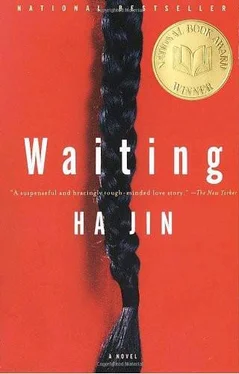"How did the divorce go?" he asked Lin.
"The court didn't approve it."
"Why?"
"My brother-in-law and his buddies made a scene outside the courthouse."
Ran Su moistened his cracked lower lip with his tongue and said, "Take heart — it will work out."
In silence they continued walking. Lin was puzzled that Ran Su didn't ask more about the divorce. It seemed that the director had something else on his mind.
They sat down in the shade of an acacia tree. In the distance the gray school building appeared whitish in the blazing sun, most of its windows open and a dozen furled flags standing atop the slate-blue roof. To Lin's right, a group of students were pulling up grass on the edge of the soccer field. They were all squatting on their haunches, a few in topees but most of them bareheaded. They looked like a herd of grazing sheep, and their slow motion was almost invisible. "Stupid," Director Su said. "Why are they getting rid of all the grass? It will be dustier in the fall."
Lin smiled and handed him a cigarette.
Ran Su lit it and asked, "Lin, do you know of Vice-Commissar Wei of the Provincial Military Command?"
"I 've heard of him. "
"He's a well-educated man, an eloquent speaker, and has a remarkable memory for words."
"What happened to him?"
"He divorced his wife two months ago, and now he's looking for a fiancee."
Lin looked at him fixedly. Ran Su went on, "I want to tell you something, but you musn't lose your temper."
"Okay, I won't."
"Commissar Wei asked our hospital to recommend to him a suitable woman. I guess he wants to marry a nurse or a doctor because he needs a wife to take care of his health. He's in his fifties, and most girls here are too young for him, so the Party Committee has been considering Manna Wu as a candidate. Among all the old maids she's the best-looking." He paused to observe Lin's face, which showed little change. He went on, "But we haven't made the final decision yet. If you're seriously opposed to this, I may be able to say a word on your behalf when we discuss it at the next meeting."
Lin remained silent for a long while, his eyes fixed on a scarlet butterfly fluttering on a leaf of a baby fern. Nearby was a troop of large ants busy transporting the dried hulk of a beetle back toward an anthill four or five feet away. Lin plucked a blade of wild buckwheat and put it between his white teeth. A numb feeling stirred in his chest.
Ran Su said again, "Come on, Lin, tell me what you think."
"Does Manna know of this?"
"Yes. We talked to her when you were away. She said she'd consider it."
"She hasn't given you her answer yet?"
"No."
Lin spat the blade of buckwheat to the ground and said, "Perhaps this will do her good. If Commissar Wei agrees to marry her, that will be fine with me."
Director Su looked at him in amazement. After a pause he said, " You're a kindhearted man, Lin. Few men would give up their woman so willingly. Some would go berserk if such a thing happened to them."
Lin cleared his throat. "I haven't said everything yet. I have two conditions, if Commissar Wei really wants her."
"What are they?"
"First, he must raise her rank two rungs up. Second, he must promise to send her to college in the near future."
Ran Su looked astonished, then burst out into a roar of laughter. Lin was puzzled by his reaction and asked, "What are you laughing at? You think I'm crazy?"
"You are so earnest, my brother. I can see you really love her." Ran Su held his nose with his thumb and forefinger and blew it on the grass. He went on, "But who are you? You've forgotten you're neither her fiance nor her bridegroom. In fact, it's inappropriate for any one of us to tell Commissar Wei what to do. Even our Party Committee can't do that."
Lin knit his thick eyebrows without saying a word. Ran Su kept on, "Don't worry yourself about the conditions. If he marries Manna Wu, of course he'll try to have her promoted and improve her status. My question to you is whether you would let her go."
After long silence, Lin muttered as though to himself, "I'm a married man and shouldn't hold her back. It's entirely up to her. "
"Lin, you have a big heart."
They got up, dusting themselves off. By accident, Lin had sat on a yellow mushroom. Touching the wet spot on the seat of his pants, he turned around and asked Ran Su, "How big is the stain?"
"Just the size of an egg."
"Damn, is it very obvious?"
"No problem. If it was on the front, it would leave a small map there and make you more attractive to girls." Ran Su laughed.
"I don't know if Manna can wash it off," Lin muttered. Since the year before last Manna had been doing laundry for him, as most fiancees would do for their men.
They turned back to the barracks. Director Su asked Lin not to reveal their talk to Manna, because he didn't want her to feel he was interfering with her personal affairs. Lin promised he wouldn't say a word.
Manna talked with Lin about Commissar Wei three days later. They both believed this was an opportunity she shouldn't miss. The man was a top officer in the province — if her relationship with him developed successfully, he could arrange for her to be transferred to Harbin. That would open a bright future for her. Possibly the commissar could place her in a crash program for training doctors or in a college to earn a diploma.
In his heart Lin was quite upset about the possibility of losing Manna. He was also angry with the commissar, who could choose any woman simply because he had power and rank. As a man, he was as smart as that old bastard, probably more handsome. Why couldn't he keep Manna? The commissar must have plenty of women already, but he had only one woman. How true the saying was: A well-fed man can never feel a beggar's hunger pangs. Lin was unhappy with Manna too, who, in his eyes, seemed eager to jump at such an opportunity. He said to himself, See how she loves power. She can't wait to drop me.
At the same time, a feeling of relief had been settling in him, because this new development meant that he might not have to push for a divorce every summer — to stir up that hornet's nest in the countryside. If he tried to divorce Shuyu again, heaven knew what kind of tricks his brother-in-law would devise against him. If this state of affairs dragged on, sooner or later Bensheng would come to the hospital to nab him. A few days ago he had told Manna about the judge's demand, and she had said she was unsure whether Lin should give out her name to the court in the future.
Bad-tempered and sarcastic, he began to make fun of Manna whenever he could. At the end of their table tennis game one evening, seeing no one else in the room, Lin said to her, "When you become that big officer's wife, don't forget me, a small powerless doctor who used to play Ping-Pong with you every week. I'll appreciate that."
"For pity's sake, stop it!" she snapped, scowling.
"It's just a joke. "
"You think I enjoy going through this thing? I feel like I'm trying to sell myself."
"Don't take that to heart. I mean — "
"I hate it! You're so happy because finally you can get rid of me."
Her eyes were flashing with anger. She put her Double Happiness paddle into its green canvas case and zipped it up. Without another word she walked out of the room.
Lin was speechless and closed his eyes as though suffering a fit of vertigo. He regretted having made the remark, but he did not follow her out. He wiped the sweat off his face with his cap. After picking up his shirt and the other paddle and turning off the lights, he went back to his dormitory alone.
Later he promised Manna that he wouldn't banter about the subject again.
It happened that Commissar Wei was going to stay for a night at Muji City on his way to the border, where he was to negotiate with the Russians for the sovereign rights to a small fortress. The fortress, constructed by the Japanese Guandong Army in the 1930 s,was intersected by the boundary line between China and the Soviet Union, and both countries now claimed it. Skirmishes had broken out when soldiers of both sides ran into each other at the fortress, but so far no guns had been fired. Instead, the patrols had used rocks, sticks, and steel whips to strike each other, because neither the Russians nor the Chinese wanted to open fire first — to be blamed for violating the cease-fire agreement.
Читать дальше











